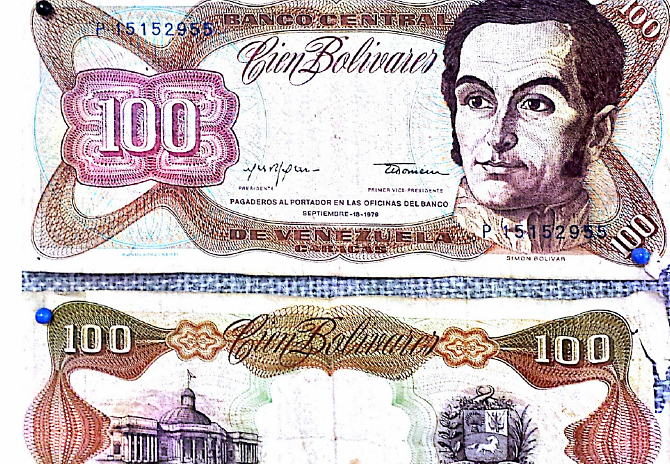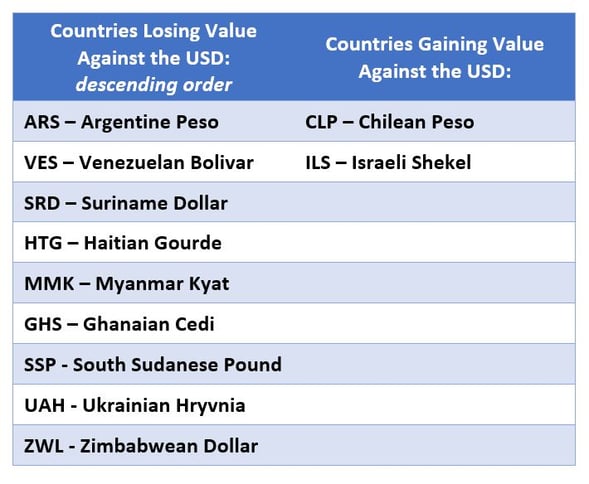Currency Performance: Worst & Best in August 2022
This month’s currency changes can be attributed to political uncertainty and foreign reserves changes. Countries with depreciating currencies have been affected by government and policy changes.
Foreign reserves in certain countries such as Argentina and Ukraine have decreased to the point where international payments are difficult to make. A few currencies appreciated, usually from an increase in investor confidence and foreign market intervention.
Currencies Losing Value against the USD (descending order):
- ARS – Argentine Peso: The Central Bank allowed the currency to depreciate, although there is no indication the Bank will devaluate its currency. The lack of cooperation in the government following former Economy Minister Martin Guzman’s resignation has lowered investor confidence. Foreign exchange restrictions were placed on companies trading shares of U.S.-based companies on the local market. The Central Bank is attempting to prevent hyperinflation by selling U.S. dollars to the marketplace, but there is a grave concern that foreign reserves are so low that this strategy will no longer be viable.
- VES – Venezuelan Bolivar: The bolivar depreciated relative to a stronger U.S. dollar, which has affected many Latin American countries. While inflation has been a concern, Venezuela experienced a slowdown in inflation as gas prices increased. President Nicolas Maduro also implemented strategies to help stabilize the exchange rate including limiting credit, increasing taxes, and reducing public spending.
- SRD – Suriname Dollar: Suriname has a debt crisis and is currently in default. Last month, creditors and the Ministry of Finance from Suriname met and negotiated to restructure the country’s debt. Negotiations fell through and an agreement was not met due to oil reserves off the coast. Creditors see this as an opportunity to benefit from this resource and have refrained from accepting a restructured deal.
- HTG – Haitian Gourde: Economists have said the cause of the gourde’s depreciation is due to the lack of trust in the government, which is not able to ensure safety for its people. Violent crime by armed groups has risen since April. Gang territories cannot be controlled by the government and the violence has left hundreds dead. Protests have been organized in Port-au-Prince against the rising level of crime and high rate of inflation.
- MMK – Myanmar Kyat: The kyat’s value fell against the U.S. dollar as the country descends into a currency crisis. The demand for the kyat decreased due to the political environment as investors and traders wait for better rates. The falling currency caused many businesses near the border of China to stop functioning entirely since the gap between the yuan and kyat is so high.
- GHS – Ghanaian Cedi: The demand for U.S. dollars continued to negatively affect the cedi since the beginning of 2022. Demand for USD exceeds the supply in the market, influencing the exchange rate gap. The United States’ interest rate hikes accelerated this along with riding oil prices. The government stated that there will be an injection of 2 billion USD into the local economy to help remedy the depreciation.
- SSP - South Sudanese Pound: The SSP’s depreciation follows the sacking of Central Bank governor Moses Makur after he announced that there will be an increase in U.S. dollars being auctioned off from $13 to $20 million. This news came as a surprise and there has been no reported reasoning why the change in personnel has occurred.
- UAH - Ukrainian Hryvnia: The Central Bank devalued the hryvnia by 25% on July 21st causing the direct change in exchange rate. The hryvnia depreciated due to economic factors from the conflict with Russia. Wheat exports have diminished, and the increased military spending has had a lasting impact on foreign reserves. The conflict has also made it difficult for Ukraine to pay off its debt since many of the country’s financial resources have been directed to the military.
- ZWL - Zimbabwean Dollar: The Zimbabwean dollar decreased steeply once again this month. The government released gold coins into the market to bring up the demand for the Zimbabwean dollar, with little effect. The government is looking to sell another quantity of gold coins in November. Additionally, the government ordered banks to cease lending to both government and the private sector to prevent speculators from borrowing Zimbabwean dollars at a lower interest rate.
Currencies Gaining Value against the USD (descending order):
- CLP – Chilean Peso: The Chilean peso appreciated sharply due to a Central Bank decision in mid-July to flood the market with 25 billion USD after the peso hit a new low of 1045 CLP: 1 USD in July. Chile is suffering from high inflation and political uncertainty from the Presidential election that concluded in December 2021. Copper prices are still low from fear of a global recession and decreased demand from overseas.
- ILS – Israeli Shekel: The shekel appreciated unusually due to low inflation rates and stock market recovery in the United States. Israeli institutional investors buy shekels when markets start to rise to hedge their investments overseas causing the value of the currency to increase. With an account surplus and an expected interest rate hike, the shekel is expected to maintain or further appreciate its value against the U.S. dollar.
How do currency changes affect compensation?
For up-to-date figures, please reach out to your AIRINC representative or click here to reach our inquiries team now.
Subscribe to our blog to stay updated on changes around the world that impact Global Mobility & compensation.





%20(28).png)



